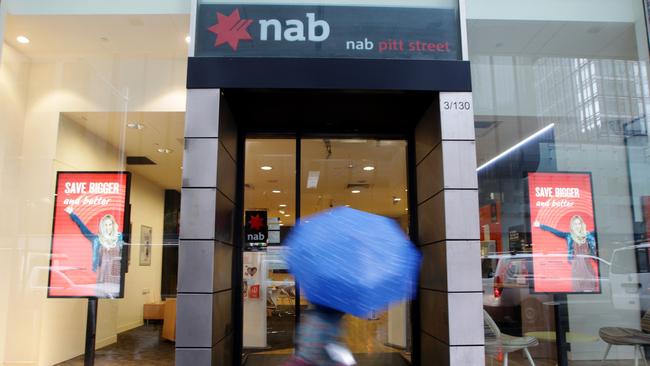Banking royal commission: Hayne terrifies banking industry
An abrupt summons to NAB executive Andrew Hagger signals a new chill between the royal commission and the banks.

An abrupt summons delivered last Friday to senior National Australia Bank executive Andrew Hagger to appear today at the financial services royal commission has signalled a new chill between the commission and the nation’s besieged banking industry.
Mr Hagger, NAB’s chief customer officer consumer and wealth, is the first bank executive to be summonsed by Ken Hayne at short notice, without the opportunity to pull together a witness statement.
It signals a much more aggressive approach by the commission, which has previously identified its likely areas of focus to targeted institutions so they can prepare their witnesses.
Last week, however, hostilities between Mr Hayne and NAB exploded.
The commissioner erupted at the bank’s senior counsel and former Federal Court judge Neil Young, accusing him of a coaching Nicole Smith — the ex-chair of NULIS, the trust company of NAB’s wealth unit MLC — in the witness box.
The exchange was ferocious, recalling the old Chinese proverb of “killing one to warn a hundred”.
“Hayne is frightening the crap out of everyone,” an observer of the gruesome spectacle says.
“The entire industry is on its toes. This is going to resonate forever.”
A director of a financial services company paused last week when asked if he thought Mr Hayne was intent on scaring the daylights out of people, using the public hearing process as a battering ram to force cultural change on the industry.
“If that’s the plan, it’s working,” the director said grimly.
The likely areas of examination for Mr Hagger include why it took so long for NAB to repay service fees taken from the accounts of superannuation funds when there was no legal entitlement.
Unlike previous NAB witnesses, Mr Hagger will also be able to give direct evidence of a 2016 discussion about remediation he had with ASIC commissioner Greg Tanzer.
While the inquisition of the superannuation industry still has a week to run, Mr Hayne’s likely course is becoming clearer.
On Wednesday, Mr Hayne asked Ms Smith if she had ever considered whether collecting fees without providing advice could expose the bank to civil or criminal proceedings.
Ms Smith responded: “I didn’t.”
Those who know Mr Hayne believe he will not hesitate to press for criminal charges against bankers where the evidence supports it.
About half the matters he heard as a Victorian Court of Appeal judge, before ascending to the High Court, were criminal in nature, so it’s an area of the law with which he’s deeply familiar.
Colleagues also describe him as someone with a very strong moral framework.
Last Thursday, NAB chief executive Andrew Thorburn launched a spirited defence of the bank. He told The Australian that he wanted to make it “very clear” that staff had not been involved in criminal acts.
“(What’s happened) sounds really serious, but it’s not about fraud. It concerns potential breaches of the Corporations Act,” he said.
Suffice to say, opinions differ on the issue.
While the practice was benignly dubbed “fees for no service” by ASIC, and was even given the acronym FFNS, you don’t have to canvass the Bar too widely to find someone prepared to call it what they firmly believe it is.
“It’s theft — the evidence is overwhelming,” one senior barrister says.
With a recommendation for a brace of criminal charges considered likely, the commissioner will also turn his attention to the structure of the $2.6 trillion super industry and its inherent conflicts.
The relatively gentle questioning of Ian Silk, head of the $140 billion not-for-profit industry fund AustralianSuper, suggested that the commissioner has a clear preference for uncluttered structures that support the strict duty to act in a customer’s best interests.
As one source in the not-for-profit industry fund sector says: “Our working theory from the commission is that, in the super industry, you can’t be the trustee, the administrator that runs the fund, the product producer, the adviser and invest the money, all at once.
“The NAB evidence shows that decisions were being made for the benefit of NAB wealth, not for the benefit of NULIS.”
It would be a big call for Hayne to recommend complete dismantling of the vertical integration model, which the industry funds have attacked as entrenching conflicts of interest.
Rob Coombe, who used to run Westpac’s wealth management arm BT Financial Group, says there is no need to go that far — all that was required was the introduction of governance measures to ensure better management of conflicts.
“The best interests rule should be driving the independence of advice from product manufacturing, but a lot of the problems have occurred because the product business has been propping up advice,” Mr Coombe says.
“The separation isn’t as rigid as it should be.
“They should have independent boards, for example.”
It’s clear that the industry funds have less to fear from Mr Hayne than their for-profit counterparts.



To join the conversation, please log in. Don't have an account? Register
Join the conversation, you are commenting as Logout